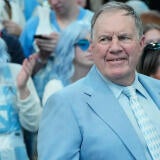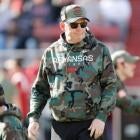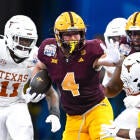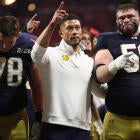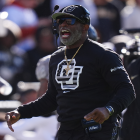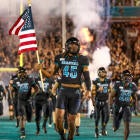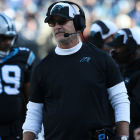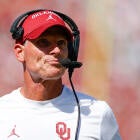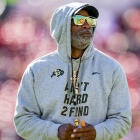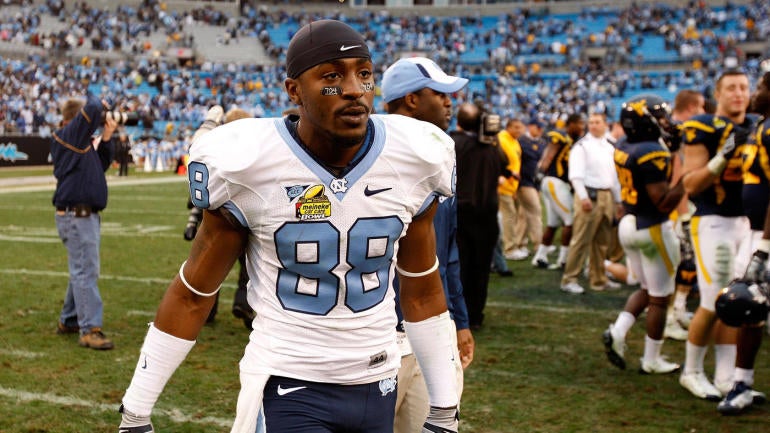
NEW YORK -- College football has been wrangled into the mud pit of college basketball's corruption trial. And some of the biggest names in the sport were invoked Tuesday: Alabama, Notre Dame, Michigan and Penn State, among others.
Tuesday saw opening arguments and the introduction of witness testimony in the second of three scheduled trials the government has brought against key figures who are accused of fraud and bribery in college basketball. The two defendants in this trial, Christian Dawkins and Merl Code, were found guilty of multiple counts of fraud in the first college basketball case, which concluded in October 2018.
The key witness now, in this trial, could prove to be Louis Martin Blazer, a self-made former financial advisor out of Pittsburgh who is a cooperating witness with the federal government. Blazer, 49, pleaded guilty to federal charges after the Securities and Exchange Commission and the U.S. Attorney's Office accused him of misappropriating funds of NFL players whose accounts he managed. The nefarious activity happened between 2010-13.
Blazer was in the position to financially advise NFL players because, per his Tuesday testimony, he paid college football players at some of the biggest schools in the sport for more than a dozen years. His experience in that space led him to be the spark for the FBI's investigation into college basketball.
On Tuesday, Blazer testified under direct examination that he directed payments to football players from Alabama, Notre Dame, Michigan, Penn State, Pittsburgh, Northwestern and North Carolina between the years 2000 and up until 2013-14.
"I paid them," Blazer said from the witness stand, noting that he did so in hopes that players would sign with him as their financial advisor.
And plenty did.
Though Blazer did not provide names, he did offer specifics regarding a couple of instances. For example, he testified that -- back in 2009 -- he paid $10,000 to the father of a Penn State player who was the 11th overall pick in that year's NFL Draft.
Blazer testified that he did so at the encouragement of a Penn State assistant coach who informed Blazer that the player's family was under some financial distress. The payment was by check and the transaction happened at the home of the Penn State coach. At the time, Penn State's head coach was Joe Paterno. Blazer noted this meeting was arranged by a Nittany Lions assistant and made no reference to any other Penn State coach.
The timeline matches with that of former Penn State linebacker Aaron Maybin, who was drafted that year by the Buffalo Bills with the 11th pick in the 2009 NFL Draft. Blazer said the prospect's father did pay him back the $10,000 after he turned pro.
"The coach wanted the player to consider staying," Blazer said. "The player was leaning on coming out."
The meeting was arranged so Blazer could be in charge of Maybin's money when he went to the NFL.
Blazer also testified he paid money to a former first-round pick from North Carolina who was drafted in 2009 by the New York Giants. Blazer's testimony correlates to former UNC wide receiver Hakeem Nicks. Blazer testified that after paying the UNC player and procuring his services, he successfully went on to recruit other North Carolina football players.
"I was later to find out I wasn't the only one paying these guys," Blazer said under oath on Tuesday in reference to some of the UNC players found to have received payments.
The NCAA previously uncovered and investigated much if not all of of what Blazer testified to doing at UNC. The NCAA punished North Carolina by placing its football program on probation, banning the Tar Heels from a bowl game in 2012, stripping it of 15 scholarships and forcing UNC to vacate all victories from the 2008 and 2009 seasons.
Blazer agreed to work surreptitiously with government in 2014, when he began secretly recording phone calls and conversations for the FBI and offered the information under cooperation with the government. He is facing a maximum of 67 years in prison if he lies or misleads in the federal investigation and this trial.
Though he admitted to myriad players payments over more than a decade, Blazer said he never paid a college coach.
"I was paying the players for me," he said, adding that he had no incentive to work for agents or, in Dawkins' case specifically, agents-in-training who are referred to as "runners."
Blazer's tactic would be to pay college football players anywhere from $100 to $3,000 per month, normally with direct cash payments. He said he sometimes got money to them via Western Union as well; Blazer testified that he would send Western Union parcels to a friend, family member or girlfriend of the college football players he was paying and then later confirm those payments with the players.
Blazer is cooperating with the government in hopes his sentencing for multiple federal money crimes eventually gets reduced.
He's yet to face a sentencing for his guilty pleas for two counts of wire fraud, one count of securities fraud, one count of lying to the SEC and one count of aggravated identify theft. This charges stemmed from Blazer taking money from his clients, some of whom were NFL players, and using their assets from 2010-2013 to fund movie and music projects without his clients' knowledge or consent.
When the trial resumes Wednesday, Blazer will continue direct examination from the prosecution before facing cross examination from the defense.
![[object Object] Logo](https://sportshub.cbsistatic.com/i/2020/04/22/e9ceb731-8b3f-4c60-98fe-090ab66a2997/screen-shot-2020-04-22-at-11-04-56-am.png)






